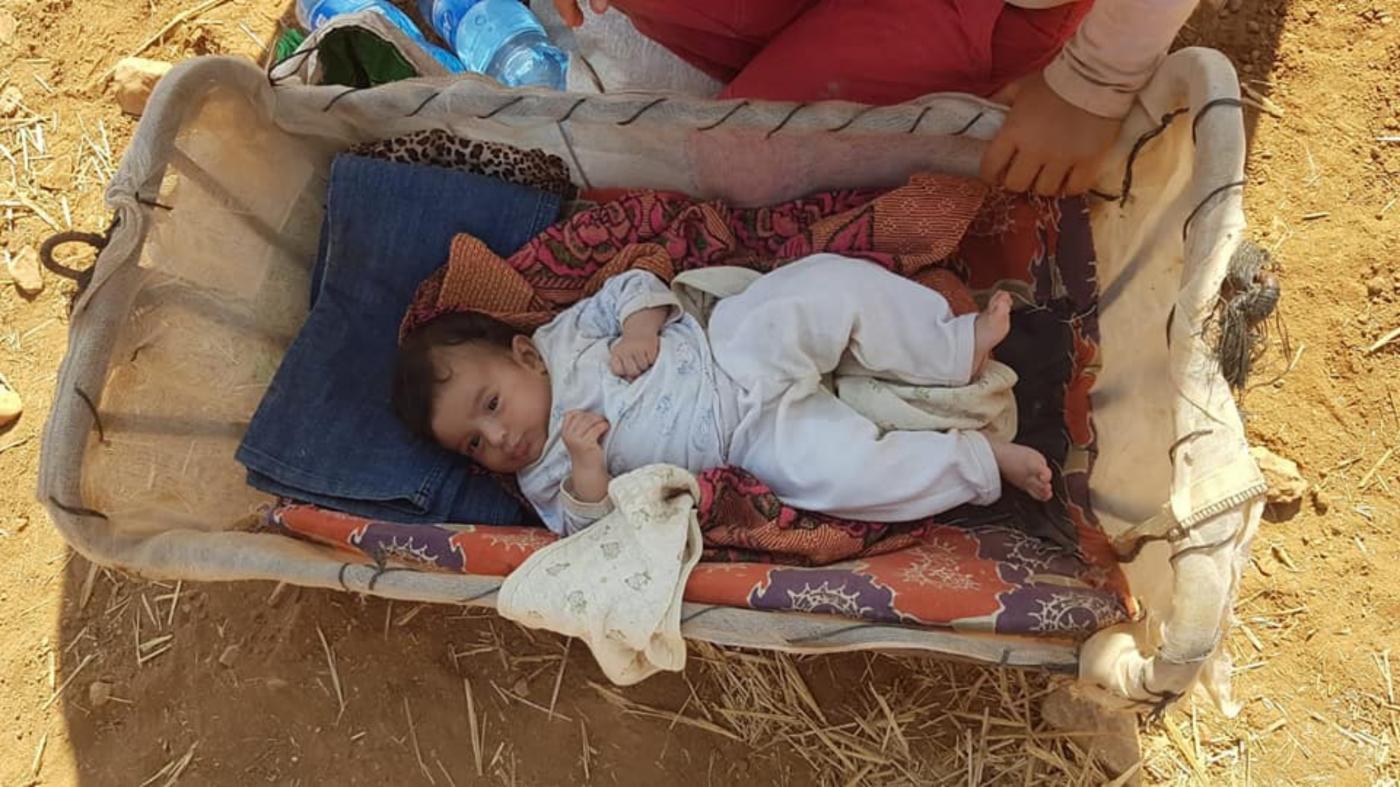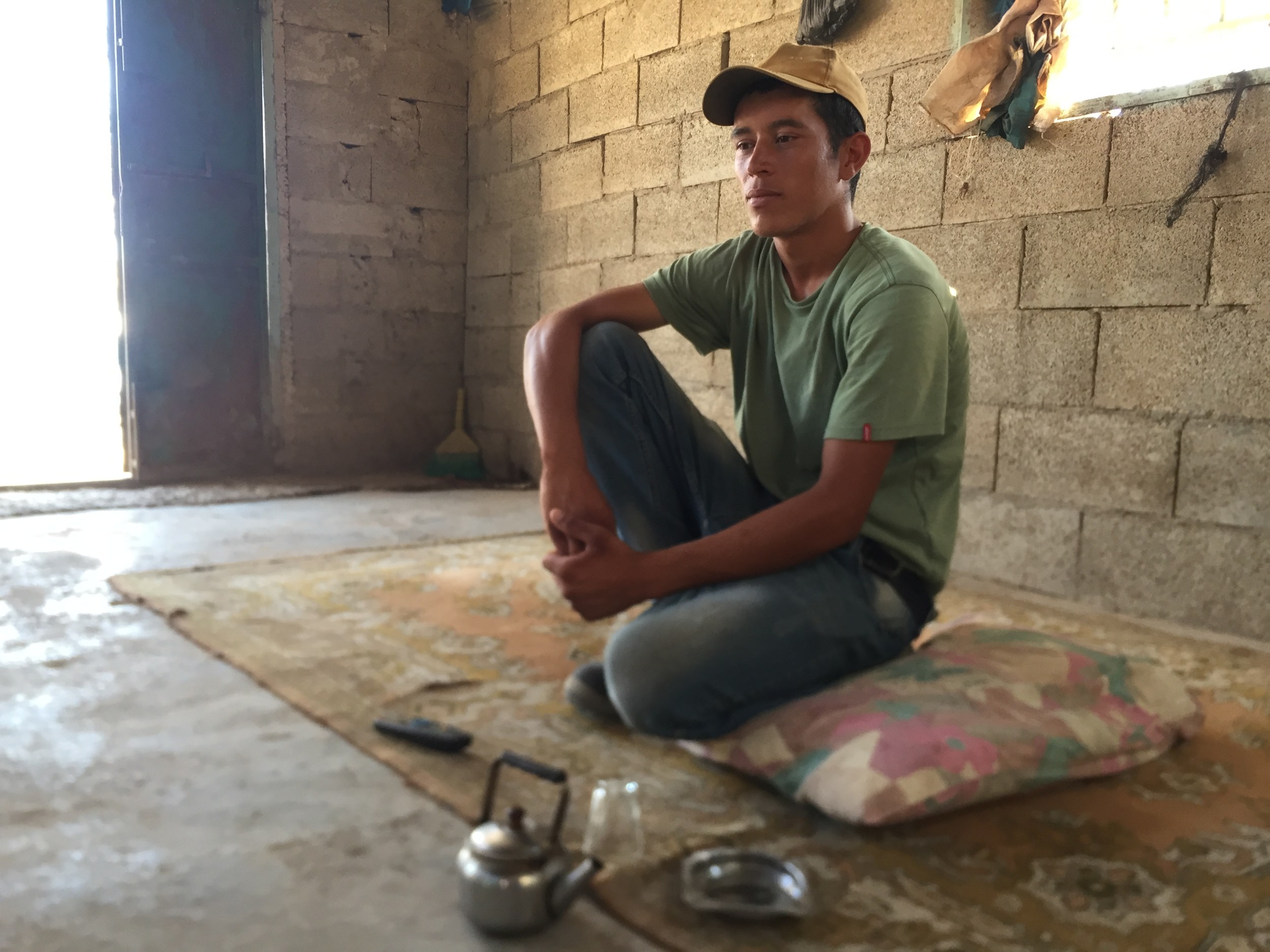
Like many Bedouins living in the Jordan Valley, Israeli soldiers have gone after the Kaabnahs for years. This time, the pursuit ended in tragedy
In the early morning hours of 5 August, 24-year-old Sara Kaabnah awoke to breastfeed her three-month-old daughter, Hanaa. But it wasn’t merely nursing time.
Sara and her whole 16-member family had to hastily pack up their belongings, including the single tent they live in, and then get on the road.
The Bedouin family, who live in the village of al-Hadidiya in the northern Jordan Valley of Jericho, were planning to move temporarily to a nearby community known as Jiftlik – a 40-minute drive away.
By relocating, the family was hoping to pre-empt the Israeli army’s arrival to confiscate their only water tank. Israeli soldiers came to their home a day earlier, took photographs of the water tank, and threatened that they would return to seize it.
Like other Bedouin families who depend on shepherding as their main source of livelihood, water for the sheep is indispensable. Finding ways to avoid the Israeli army is part of the family’s survival.
Sara wrapped baby Hanaa in her arms and set off with her family on a tractor – their only means of transport. A portion of the group led the sheep on foot and another waited until the tractor was back to pick them up.
But things didn’t go according to plan. Sara and Hanaa never made it to Jiftlik.
As the family drove in the midst of the prevailing darkness, two Israeli vehicles collided with the tractor near a military checkpoint. The tractor overturned and Hanaa flew out of her mother’s arms to her death. Sara remained lodged underneath the heavy vehicle.
Israeli ambulance teams quickly informed the family that Hanaa was killed in the car accident. Her mother remains in a coma, unaware that she will never see or hold her only child again.
"We escaped for fear of having our water tank confiscated – fear of thirst,” Odeh Kaabnah tells Middle East Eye. "Our daughter died because of the Israeli army’s constant pursuit of us, and now I may lose my wife as well."
 'Our daughter died because of the Israeli army’s constant pursuit of us, and now, I may lose my wife as well,' Odeh Kaabnah said (MEE/Shatha Hammad)
'Our daughter died because of the Israeli army’s constant pursuit of us, and now, I may lose my wife as well,' Odeh Kaabnah said (MEE/Shatha Hammad)
With a trembling voice and tears in his eyes, Odeh explains that the couple had named their baby daughter Hanaa, which means ‘happiness’ in Arabic, after his mother. It is ironic, the 24-year-old says, as Hanaa never got the opportunity to feel and understand the sentiment behind her name.
When Hanaa was 10 days old, the Israeli army demolished the family’s home. Before she turned two months old, the army once again demolished their home and displaced the family. And when she turned three months old, she died as her family tried to run from the army's latest operation targeting their home.
“The Israeli army demolished our five tents and barracks – some that we live in, and some that we use as shelter for the sheep,” says Odeh. They did so twice in the span of a month, he explained, once on 30 June and the other on 20 July.
Bedouins in the Jordan Valley
The Kaabnahs fill their water tank on a daily basis from a spring in a nearby area. They then have to transport it back to al-Hadidiya for personal use and for the sheep to drink. This essential activity takes at least an hour of their day.
“If they [Israeli army] confiscate our water tank, we will lose our sheep, and we will no longer be able to live here. Our water tank and the tractor are the only two things that we own and allow us to live a very simple life,” says Odeh.
Al-Hadidiya and many other traditionally nomadic Bedouin communities in the Jordan Valley have been the targets of Israeli policies aimed at creating coercive conditions to push the communities to leave. Such policies have come in the form of near-daily demolitions, confiscations, intentional de-development and obstruction of any efforts to set up infrastructure such as water or electricity grids.
Direct or indirect forcible displacement of an occupied civilian population is considered a war crime under international law.
The majority of Bedouin communities in the West Bank happen to live in what was designated Area C, which covers 60 percent of the occupied West Bank, as part of the 1993 Oslo Accords signed between Israel the Palestine Liberation Organisation (PLO). Since the agreement was signed, the area has come under full Israeli civil administration and security control. It was designated as such to encompass Israeli settlements housing more than 600,000 settlers in the West Bank, all of which are illegal under international law.
While Israeli settlements continue to flourish, the Israeli army prevents Palestinian communities in Area C from expanding or even remaining on the land they presently live on. The army requires building permits for anything ranging from an animal shelter to a home, while simultaneously refusing to issue any. It then proceeds to punitively demolish the structures of livelihood for the communities.
Politics of water
Muayyad Bisharat, the northern Jordan Valley coordinator for the Union of Agricultural Work Committees (UAWC) – a nonprofit that aids Palestinian farmers and herders – says that the Kaabnah family's experience is common in the Jordan Valley.
About 87 percent of water sources in the West Bank fall under Israeli control as per the Oslo Accords. With Israeli discriminatory policies, Palestinians have had a severe problem accessing water.
The majority of the underground wells, explains Bisharat, were dug between 1948 and 1967 under Jordanian rule in the West Bank, and only reach about 70 metres deep. With the passage of time, the water in some of the wells has become salty and others have dried up due to Israeli policies forbidding Palestinians from restoring and developing them.
In the meantime, Israeli authorities allow settlers to dig their wells as deep as 500 metres, pumping large quantities of water to agricultural settlements and military bases.
“Water transportation pipes run under Bedouin communities and Palestinian villages, though Palestinians are forbidden from using this water. The vast majority are forced to buy the water and to transport it across long distances, costing them about $50 for one water tank,” says Bisharat.
Israeli leadership has on several occasions expressed intent to maintain full control of the Jordan Valley, which contains much of the West Bank's rich natural resources and is deemed indispensable by Israel.
“The army is chasing us, the settler guards are chasing us, the Israeli civil administration is chasing us and raiding our homes on a daily basis. They attack us in front of our families for no reason,” says Odeh, adding that he believes that the assaults are not merely physical but also psychological, aimed at instilling fear within the families.
Odeh and Sara married at an early age in 2016, in accordance with Bedouin traditions. He imagined his life would be much more stable, he says.
“I built a concrete room with a zinc rooftop for us to live in. A few months after our wedding, the Israeli army demolished the room,” he says.
The army proceeded to demolish the room again when he rebuilt it.
“Since we got married and built a family, we have been suffering because of the Israeli army and their persecution. My life has been turned into fear and anxiety, and moving from one place to another.”
Ongoing suffering
Odeh has only managed to visit his wife Sara in the hospital once, and only for a few minutes. He is awaiting another Israeli permit, which he needs to enter Jerusalem, where she is being treated at the intensive care unit of Hadassah hospital.
“Sara has been in a coma since the accident. She has a head injury, is suffering from fractures to the skull and face, and internal bleeding in her lungs,” said Odeh.
On the one hand, he fears losing her. On the other, he is afraid of the moment he has to tell her about the death of their baby daughter. How will he tell her when she asks about Hanaa? What will he say? he wonders.
He paused before being able to describe what Sara looked like when he visited her.
“She was like a corpse. Nothing moved, except her chest as she breathed. I am extremely afraid that she will pass.
“All that I wish for in this moment is for Sara to live, to come back to us. We’ve been through enough pain. We just want to live.”


 'Our daughter died because of the Israeli army’s constant pursuit of us, and now, I may lose my wife as well,' Odeh Kaabnah said (MEE/Shatha Hammad)
'Our daughter died because of the Israeli army’s constant pursuit of us, and now, I may lose my wife as well,' Odeh Kaabnah said (MEE/Shatha Hammad)
WRITE YOUR COMMENT